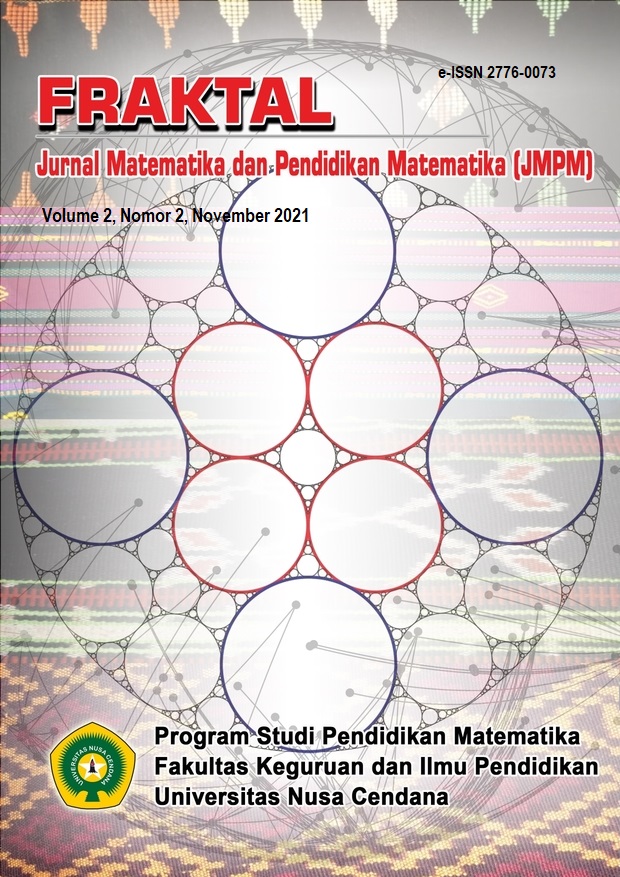Profil Kemampuan Metakognisi Siswa Kelas XII SMA Negeri 1 Atambua dalam Pembelajaran Matematika
Abstract
Metacognitive ability is one of the important factors that affect students' mathematics learning achievement. This study investigated the profile of students' metacognitive ability. This study aimed to describe the level of students' metacognitive abilities in general and based on each aspect and indicators. The method of this research is descriptive quantitative by taking 1 class as sample from 4 classes population, with the sampling method used is random sampling. The instruments used in this research was Metacognitive Awareness Inventory (MAI) questionnaire. The results showed tha generally most of students have a good and good enough metacognition ability. It is also found that for each aspect most of students have good and good enough metacognition knowledge and metacognition skills. Meanwhile, based on its indicator for each aspect it is found that there were students with poor declarative knowledge (aspect of metacognition knowledge) and also there were students with poor evaluation skills (aspect of metacognition skills). For others indicators, it is found that students have good and good enough procedural knowledge, condisional knowledge, planning skills, and monitoring skills.
Keywords: Metacognitive ability, metacognitive knowledge, metacognitive skills.
Downloads
References
Chrissanti, M. I., & Widjajanti, D. B. (2015). Keefektifan pendekatan metakognitif ditinjau dari prestasi belajar, kemampuan berpikir kritis, dan minat belajar matematika. Jurnal Riset Pendidikan Matematika, 2(1), 51.
Flavell, J. H. (1979). Metacognition and cognitive monitoring: A new area of cognitive-developmental inquiry. American Psychologist, 34 (10), 906–911.
Herawaty, D. (2017). Peningkatan kompetensi siswa SMP di Kota Bengkulu melalui penerapan model pembelajaran matematika (MPM-SMP). Jurnal Pendidikan Matematika Raflesia. 2(1). 46-64.
Huitt, W. G. (1997). Metacognition. Tersedia di: http://www.edpsycinteractive.org/topics/cognition/metacogn.html. Diakses tanggal 10 Oktober 2021.
Ifenthaler, D. (2012). Determining the Effectiveness of Prompts for Self Regulated Learning in Problem-Solving Scenarios. Educational Technology & Society, 15 (1), 38–52.
Larkin, S. Metacognition in Young Children. Loondon: Routledge.
Livingston, J. A. (1997). Metacognition: an overview. Tersedia di: http://gse.buffalo.edu/fas/shuell/cep564/metacog.html. Diakses tanggal 8 Oktober 2021.
Mahmudi, A. (2013). Strategi Metakognitif Dalam Pembelajaran Matematika. Prosiding Seminar Nasional Penelitian, Pendidikan dan Penerapan MIPA. Yogyakarta: Universitas Negeri Yogyakarta.
Mulbar, Usman. (2008). Pembelajaran Matematika Realistik yang Melibatkan Metakognisi Siswa di Sekolah menengah Pertama. Surabaya : Perpustakaan Pascasarjana UNESA, Disertasi.
Mulbar, U. (2008). Metakognisi Siswa Dalam Menyelesaikan Masalah Matematika. Tersedia di: http//www. usmanmulbar. files. wordpress. com. Diakses pada 8 Oktober 2021.
Ozsoy, G. (2011) An investigation of the relationship between metacognition and mathematics achievement. Asia Pacific Education Review, 12, 227.
Ozsoy, G. & Ataman, A. (2009). The Effect of Metacognitive Strategy Training on Mathematical Problem Solving Achievement. International Electronic Journal of Elementary Education, 1 (2), 68-82.
Peraturan Menteri Pendidikan dan Kebudayaan Nomor 20 Tahun 2016 Tentang Standar Kompetensi Lulusan Pendidikan Dasar dan Menengah.
Prasetyoningrum, F. D., & Mahmudi, A. (2017). Pengaruh strategi metakognitif terhadap kemampuan pemecahan masalah matematis siswa kelas VIII di SMP Negeri 6 Yogyakarta. Jurnal Pendidikan Matematika - S1, 6(4), 19-27. Tersedia di: http://journal.student.uny.ac.id/ojs/index.php/pmath/article/view/6971/6696. Diakses pada 8 Oktober 2021.
Ratnasari, G. I., & Widjajanti, D. B. (2015). Efektivitas pembelajaran matematika dengan model brain based learning dalam pendekatan saintifik ditinjau dari kemampuan metakognisi dan sikap bertanggung jawab siswa SMA N 1 Kasihan Bantul (Unpublished undergraduate thesis).Universitas Negeri Yogyakarta.
Rozen, M. T. & Kramarski, B. (2014). Metacognition, Motivation, and Emotions: Contribution of Self-Regulated Learning to Solving Mathematical Problems. Global Education Review, 1(4), 76-95.
Schraw, G., & Dennison, R. S. (1994). Assessing metacognitive awareness. Contemporary Educational Psychology, 19(4), 460–475.
Septiyani, E., Ramdhan, B., & Juhanda, A. (2020). Profil Kemampuan Metakognitif Siswa Pada Pembelajaran IPA Kelas VII Di SMPN 13 Kota Sukabumi. Jurnal Biotek, 8 (1), 1-16.
Sopia, H. F. (2015). Keefektifan Pendekatan Matematika Realistik ditinjau dari Prestasi, Pemecahan Masalah, dan Kepercayaan Diri Siswa. Seminar Nasional Matematika dan Pendidikan Matematika UNY 2015, 807-814.
Sudia, M. (2015). Profil Metakognisi Siswa SMP Dalam Memecahkan Masalah Open-Ended Ditinjau dari Tingkat Kemampuan Siswa. Jurnal Math Educator Nusantara, 1(1), 29-40.
Syaiful. (2011). Metakognisi siswa dalam pembelajaran matematika realistik disekolah menengah pertama. Edumatica, 1(2).
Udil, P.A. (2019). Proses Metakognisi dalam Pemecahan Masalah Matematika. Prosiding Seminar Nasional Pendidikan Matematika 2019. Kupang: Universitas Nusa Cendana.
Udil, P.A., Kusmayadi, T. A., &Riyadi. (2017). Metacognition Process of Students with High Mathematics Anxiety in Mathematics Problem-Solving. International Journal of Science and Applied Science: Conference Series, 2(1), 261-272.
Copyright (c) 2021 FRAKTAL: JURNAL MATEMATIKA DAN PENDIDIKAN MATEMATIKA

This work is licensed under a Creative Commons Attribution-NonCommercial-ShareAlike 4.0 International License.
- Hak publikasi atas semua materi naskah jurnal yang diterbitkan/dipublikasikan dalam situs E-Journal Fraktal ini dipegang oleh dewan redaksi dengan sepengetahuan penulis (hak moral tetap milik penulis naskah).
- Ketentuan legal formal untuk akses artikel digital jurnal elektronik ini tunduk pada ketentuan lisensi Creative Commons Attribution-ShareAlike (CC BY-SA), yang berarti Jurnal Fraktal berhak menyimpan, mengalih media/format-kan, mengelola dalam bentuk pangkalan data (database), merawat, dan mempublikasikan artikel tanpa meminta izin dari Penulis selama tetap mencantumkan nama Penulis sebagai pemilik Hak Cipta.
- Naskah yang diterbitkan/dipublikasikan secara cetak dan elektronik bersifat open access untuk tujuan pendidikan, penelitian, dan perpustakaan. Selain tujuan tersebut, dewan redaksi tidak bertanggung jawab atas pelanggaran terhadap hukum hak cipta.

 Israfil Israfil(1*)
Israfil Israfil(1*)










